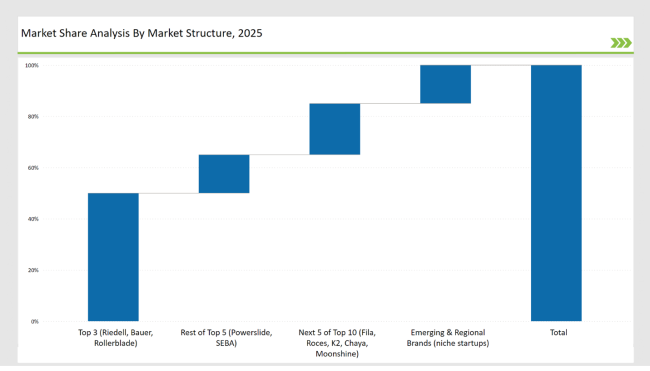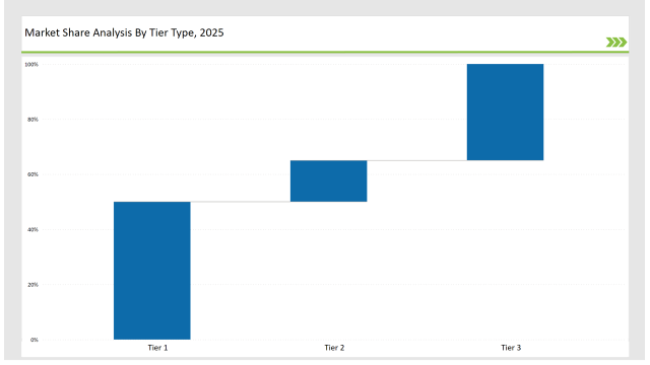The global garment steamer market comprises large multinational corporation’s regional leaders emerging startups in a dynamic somewhat fiercely competitive landscape. Established brands dominate but niche players slowly carve out space with uniquely innovative solutions.
Major brands like Philips Conair Rowenta hold roughly 60% market share largely because of their strong brand reputation and massive distribution channels. These companies focus on high-end innovations offering garment steamers with remarkably efficient steam functionality and advanced heating technologies that boost user experience greatly.
Their premium positioning alongside robust product development capabilities generally ensures a massive competitive advantage somehow exists. European brands like Tefal and Asian ones such as Panasonic occupy roughly 20% of the market share somehow.
These companies cater regionally offering garment steamers aligned with local demands like compact storage solutions energy-efficient performance and affordability. Their ability to tailor products for specific markets helps them establish solid presence in respective regions and expand reach globally somehow.
Roughly 20% of market space falls under the control of fledgling companies and obscure brands redefining norms via bold innovative moves slowly. Emerging players prioritize designs that are compact and travel-friendly with sustainability-driven features and smart functionalities like IoT connectivity.
Eco-friendly materials strongly appeal directly to reduce water consumption and enhanced portability for modern consumers. Smaller brands steadily gain traction fairly quickly nowadays by offering bold solutions that somehow align with trends in convenience sustainability.
Explore FMI!
Book a free demo
| Market Segment | Industry Share (%) |
|---|---|
| Top 3 (Philips, Conair, Rowenta) | 50% |
| Rest of Top 5 (Tefal, Panasonic) | 15% |
| Next 5 of Top 10 (Black+Decker, J-2000 Jiffy, Steamfast, PurSteam, Electrolux) | 20% |
| Emerging & Regional Brands (Niche Startups) | 15% |

| Assessment | Market Share Description |
|---|---|
| High (more than 60% by top players) | Dominated by top global brands |
| Medium (40 to 60% by top 10 players) | Balanced market with competitive players |
| Low (less than 30% by top players) | Fragmented market with regional dominance |
The garment steamer market is moderately consolidated, Top brands such as Philips Conair Jiffy rule premium segments and mid-range markets with emerging players serving budget consumers. Market trends shift rapidly due to soaring demand for swift alternatives beneath urban skies surrounded by burgeoning apparel sectors. E-commerce platforms significantly boosted sales through digital pathways increasingly. Technological advancements like portable steamers shape market trends rapidly due to their multi-functional capabilities and widespread adoption
The sales of garment steamers are divided between modern and traditional channels. Online platforms and brand websites contribute to 55% of total sales due to convenience and diverse product availability. Appliance retail stores hold a 30% share, offering in-store demonstrations and personal assistance. The remaining 15% of sales are driven by specialty home appliance outlets and direct-to-consumer (DTC) platforms.
Upright/ Non-Portable Garment Steamer: Representing 65% of the market, these are favored for their portability and affordability, making them popular among travelers and households. Handheld/Portable Garment Steamer Holding 30% of the market, these cater to heavy users, including professionals and boutique owners.
2024 witnessed significant advancements in the garment steamer industry, driven by sustainability, technological innovation, and consumer-focused designs. Key market players contributed in the following ways:

| Tier Type | Tier 1 |
|---|---|
| Example of Key Players | Philips, Conair, Rowenta |
| Market Share (%) | 50% |
| Tier Type | Tier 2 |
|---|---|
| Example of Key Players | Tefal, Panasonic |
| Market Share (%) | 15% |
| Tier Type | Tier 3 |
|---|---|
| Example of Key Players | Regional brands, startups |
| Market Share (%) | 35% |
| Brand | Key Focus Areas |
|---|---|
| Philips | Enhancing steam efficiency and rapid heat technology |
| Conair | Innovating ergonomic and travel-friendly models |
| Rowenta | Developing eco-friendly steaming solutions |
| Tefal | Expanding professional-grade steamers |
| Panasonic | Integrating smart and automated features |
| Emerging Brands | Focusing on affordability and sustainability |
Global garment steamer market will undergo rapid transformation driven by major brands prioritizing sustainability through e-commerce expansion and technological advancements rapidly. Leading companies invest heavily in innovative solutions enhancing product efficiency and consumer convenience amid fierce market rivalry somehow. Industry undergoes significant change via digital-first strategies brands leverage e-commerce platforms reaching broader customer base streamlining sales.
Digital product debuts gain popularity rapidly through virtual platforms allowing businesses introduce highly specialized models suited evolving consumer demands. Subscription-based services gain traction rapidly enabling brands foster deep customer bonds through highly personalized offers and hassle-free maintenance. Strategic collaborations with social media influencers alongside home appliance specialists significantly bolster brand loyalty via real-world demos and trusted feedback.
Brands enhance consumer engagement by integrating influencer marketing into promotional strategies and build stronger connections with trend-conscious buyers somehow. These partnerships significantly boost product visibility somehow and credibility driving sales rapidly in highly competitive markets. Sustainability stays upfront in industry evolution with increasing focus on Eco conscious methods and green technology implementation daily.
Major brands incorporate biodegradable materials rapidly reducing waste and introducing steamers with pretty energy-efficient tech somehow. Innovations like eco-friendly steamers with auto-shutoff features drive a strong shift towards greener solutions rapidly every day. Eco-aware consumers drive brands deeply into sustainability now. Brands prioritizing sustainability and tech advancements will stay ahead in a fiercely competitive market driven by regulatory pressures..
Philips, Conair, and Rowenta collectively dominate the market with 50% share.
Regional brands such as Tefal and Panasonic hold approximately 20% of the market by focusing on localized consumer needs.
Startups focusing on sustainability and smart steamers account for 15% of the market.
The market is categorized as high for top players holding over 60%, medium for the top 10 brands capturing 40% to 60%, and low for fragmented market shares below 30%.
Korea Women’s Footwear Market Analysis - Size, Share & Trends 2025 to 2035
Japan Women’s Footwear Market Analysis - Size, Share & Trends 2025 to 2035
Korea Garment Steamer Market Analysis – Size, Share & Trends 2025 to 2035
Japan Garment Steamer Market Analysis - Size, Share & Trends 2025 to 2035
Western Europe Fabric Stain Remover Market Analysis – Size, Share & Trends 2025 to 2035
Korea Natural Cosmetics Market Analysis – Size, Share & Trends 2025 to 2035

Thank you!
You will receive an email from our Business Development Manager. Please be sure to check your SPAM/JUNK folder too.